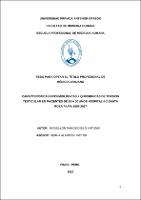Características epidemiológicas y quirúrgicas de torsión testicular en pacientes de 18 a 30 años Hospital II-2 Santa Rosa Piura 2006-2017

View/
Download
(application/pdf: 471.9Kb)
(application/pdf: 471.9Kb)
Date
2020Author(s)
Mogollón Ramos, Diego Antonio
Metadata
Show full item recordAbstract
OBJETIVO: Estudiar las características epidemiológicas y quirúrgicas de
torsión testicular en pacientes de 18 a 30 años en el Hospital II-2 Santa Rosa
Piura durante los años 2006 – 2017.
METODOLOGIA: Estudio Retrospectivo, con toma de datos secundarios
mediante la cual se estudiaron las características epidemiológicas y quirúrgicas
de torsión testicular en pacientes de 18 a 30 años en el Hospital II-2 Santa
Rosa Piura durante los años 2006-2017. Se incluyeron 39 pacientes cuyas
historias clínicas contaron con las variables en estudio cumpliendo con los
criterios señalados. Se calculó las frecuencias y porcentajes, se usó la
mediana, desviación estándar y rango. En las asociaciones se utilizó la prueba
de Chi2 y T-Student.
RESULTADOS: Se encontraron a 39 pacientes con diagnóstico de torsión
testicular de 18 a 30 años durante el 2006 al 2017, siendo reportados con
mayor frecuencia entre el período de los años 2006-2008, 13 casos (33.33%);
la mediana en cuanto a la edad es de 21 años. El tiempo de enfermedad de los
pacientes tuvo como promedio 2.53+/-0.94 días. En 35 casos fueron
intervenidos quirúrgicamente mediante orquiectomía. El tiempo de
hospitalización en promedio de los pacientes no complicados fue 1.3 +-0.48
días mientras que los pacientes complicados fueron 3.27 +- 0.99 días.
CONCLUSIONES: Las características epidemiológicas y quirúrgicas de torsión
testicular en pacientes de 18 a 30 años Hospital II-2 Santa Rosa Piura 2006-
2017 fueron estar dentro del grupo etario entre los 18 a 21 años, así mismo
mayor frecuencia residencia rural, el tratamiento destacado fue el quirúrgico
(orquiectomía). Los pacientes complicados fueron con mayor frecuencia
aquellos que se les realizó cirugía, sin embargo, no hubo diferencia significativa
con respecto a los no complicados, pero, se encontró diferencia significativa
con respecto al tiempo de hospitalización p<0.001. OBJETIVE: To study the epidemiological and surgical characteristics of
testicular torsion in patients aged 18 to 30 years at Hospital II-2 Santa Rosa
Piura during the years 2006 - 2017.
METHODOLOGY: Retrospective study, with secondary data collection through
which the epidemiological and surgical characteristics of testicular torsion were
studied in patients aged 18 to 30 years at Hospital II-2 Santa Rosa Piura during
the years 2006-2017. Thirty-nine patients whose medical records included the
study variables meeting the criteria indicated were included. Frequencies and
percentages were calculated, median, standard deviation and range were used.
Chi2 and T-Student tests were used in the associations.
RESULTS: They found 39 patients diagnosed with testicular torsion from 18 to
30 years old from 2006 to 2017, with 13 cases (33.33%) being reported more
frequently between the period of the years 2006-2008; the age in terms of age
is 21 years. The sickness time of the patients averaged 2.53 +/- 0.94 days. In
35 cases, they underwent surgery by orchiectomy. The average hospitalization
time of the uncomplicated patients was 1.3 + -0.48 days, while the complicated
patients were 3.27 + - 0.99 days.
CONCLUSIONS: The epidemiological and surgical characteristics of testicular
torsion in patients aged 18 to 30 years Hospital II-2 Santa Rosa Piura 2006-
2017 were being within the age group between 18 and 21 years, as well as the
highest frequency of rural residence, the outstanding treatment was the surgical
(orchiectomy). Complicated patients were more frequently those who underwent
surgery, however, there was no significant difference with respect to
uncomplicated patients, but a significant difference was found with respect to
hospitalization time p <0.001.
Collections
- Medicina Humana [2969]

